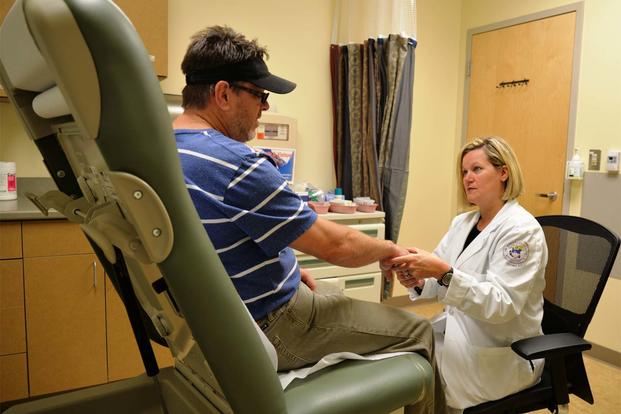President Donald Trump was expected to sign a bill Wednesday extending the current Veterans Choice Program, which allows vets to opt for private care.
However, new VA Secretary Dr. David Shulkin has said the program still needs a major fix from Congress before the end of the year.
Shulkin said he is also counting on Congress to pass additional legislation overhauling the disability claims appeals process, adding that Trump's 90-day hiring freeze on the federal workforce had limited the ability of the Department of Veterans Affairs to bring on more claims processors to tackle the backlog in initial disability claims.
In a wide-ranging C-Span interview Sunday, Shulkin said Trump's scheduled April 19 signing of the Choice extension would be a major milestone for the VA but that an entirely new choice program is needed to "integrate" private care more seamlessly with that offered by the VA.
"We need to make sure the Choice program not only continues, but it works better for veterans," he said. "And we know it hasn't worked the way we wanted it to work. It's too complex; it's too hard to use. So we are working hard now with Congress to redesign a better, improved way of accessing care in the community."
Veterans service organizations feared that Trump's drumbeat of criticism aimed at the VA during the election campaign signaled the full privatization of veterans' care, but Shulkin said, "I am not in favor of privatization of the VA. We have to maintain a strong VA."
He added, "That doesn't mean we shouldn't be working more closely with the private sector."
Shulkin said he is asking Congress for authority to give veterans more choice for private care in cases where the VA is falling short "or isn't doing as well." The goal would be to give veterans "the best of what the VA offers, the best of what the private sector offers," he said.
Shulkin praised the House and Senate for passing the bill to extend the current Veterans Choice Program past the sunset date of Aug. 7. The bill would also allow the VA to continue to spend the $950 million left for the Choice program past August.
Shulkin said he expects to send Congress proposals for reforming the Choice program in the fall, leaving a short window for Congress to act on passing legislation that Shulkin said is necessary in this calendar year.
The proposed "Choice 2.0" plan could include elimination of the wait time and distance rules in the current program, along with new procedures for scheduling appointments and repaying private-sector physicians, Shulkin said.
The Veterans Choice Program was enacted in 2014 in response to the wait-times scandals at the Phoenix VA. Since it went into effect, more than 1.5 million veterans have made seven million appointments with private health care providers in their communities, according to the VA.
"So we are working hard now with Congress to redesign a better, improved way of accessing care in the community," Shulkin said.
On disability claims, he said that reforming the badly backlogged appeals process is a top legislative priority. "Our appeals process is going to remain broken and actually get worse" without major reform of the current rules, which he said were written in the 1930s.
Last month, the Government Accountability Office recommended a hiring surge at the VA to handle appeals and also called for Information Technology improvements to speed the process.
"The VA noted that its technology infrastructure is outdated and needs improvement," the GAO said. While the VA proposed new IT systems, the GAO said that the VA lacks a plan for how and when the new system will be implemented.
"Without a detailed schedule, VA risks not having new systems aligned with potential changes in the appeals process when they are implemented," the GAO said.
Shulkin said the backlog in disability appeals now stands at about 450,000 cases. Without action from Congress, "that's just going to continue to grow," he said.
He said the backlog of initial disability claims has been reduced from about 611,000 in recent years to about 100,000 cases, but there was a slight uptick during the hiring freeze.
One way of addressing the initial claims backlog is to increase the ability of the VA to go "paperless" on initial claims, Shulkin said. Six VA centers now have the ability to do paperless filing and more were expected to come online this year, he said.
The VA mostly escaped the impact of Trump's now-expired 90-day federal hiring freeze. About 41,000 of the VA's 45,000 open positions were exempted, but the 4,000 slots that were frozen included administrative positions for claims processors, he said.
With additional claims processors, the VA should be able to begin addressing the backlog of 100,000 initial claims. "That's one of my priorities -- to get it under 100,000," Shulkin said.
-- Richard Sisk can be reached at Richard.Sisk@Military.com.



























